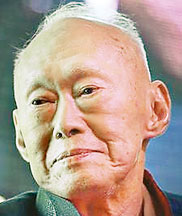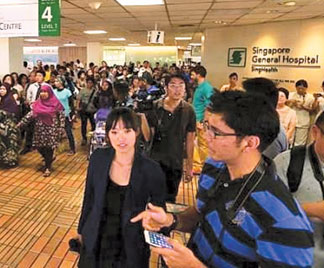Singapore prepares for life after founding father Lee Kuan Yew
Crowds have gathered outside Singapore General Hospital to pay
tribute, and family members have been seen visiting. “It will be sad
when he dies. He has his flaws but (he) has achieved a lot for this
country,” teaching assistant Imad Alatas, 33, told AFP at the
hospital.
 |
|
Singapore’s former prime
minister Lee Kuan Yew is critically ill in intensive care.
Photograph: Xinhua News Agency |
The Island nation’s first prime minister is critically ill in
intensive care although reports of his death have been dismissed as a
hoax
Singapore’s ‘founding father’ Lee Kuan Yew is critically ill in
hospital, and the island state he led for three decades is preparing for
life without the domineering politician who guided it to independence
and prosperity.
91-year-old Lee, Singapore’s first and longest-serving prime
minister, has receded from public life in recent times, but he remains a
revered figure in the country he led for 31 years.
Crowds have gathered outside Singapore General Hospital to pay
tribute, and family members have been seen visiting. “It will be sad
when he dies. He has his flaws but (he) has achieved a lot for this
country,” teaching assistant Imad Alatas, 33, told AFP at the hospital.
Civil servant Asyraf Jalil, 26, said: “He is a good man and I’ve
always seen him as the father of modern Singapore.”
Current Prime Minister, and Lee’s son, Lee Hsien Loong, issued a
statement saying only: “Lee Kuan Yew remains critically ill in the ICU
and has deteriorated further”.
An earlier statement said the patriarch had been administered
antibiotics and that doctors were “closely monitoring his condition”.
Lee was hospitalised with severe pneumonia in early February. He was
placed on mechanical ventilation in the hospital’s intensive care unit.
Lee served as Singapore’s first prime minister from 1959, when
Singapore won self-rule, until 1990 when he stepped down.
He led Singapore’s six-year transition from British colonial outpost,
through self-administration, merger with and then separation from
Malaysia, to independent statehood, and Singapore declaration as a
republic, in 1965.
Lee was a founding member of the governing People’s Action party and
is credited with transforming Singapore from a sleepy Asian entrepot
into a bustling and wealthy financial hub.
He encouraged economic growth with easy regulation and low taxes for
business, and by employing a large government apparatus to look after
citizens.
But progress came at the expense of civil liberties.
Critics and human rights groups condemned his iron-fisted rule of his
country which saw his political opponents jailed, exiled, or driven to
financial ruin through costly libel suits.
 |
|
Members of the public and
journalists gathered at the Singapore General Hospital after
news broke that former prime minister Lee Kuan Yew was
critically ill.
-PHOTO: NEO XIAOBIN |
Only 12 opposition politicians have ever been elected to parliament
in Singapore.
From 1965 to 1981, the ruling party won every seat in every election.
Parliament was formed with no elected opposition MPs for almost two
decades..
Media freedoms were also stifled, and political dissent was not
tolerated.
Lee retained cabinet-level advisory posts - such as ‘minister mentor’
after handing over the premiership to Goh Chok Tong in 1990.
He resigned from the cabinet in May 2011 after his party won its 14th
consecutive general election.
The People’s Action party’s 2011 election win was by its slimmest
ever margin, though the party still commands a dominant parliamentary
majority.
Lee was re-elected to his seat unopposed.
Earlier on Thursday, a website closely resembling the prime
minister’s website announced that Lee had died.
This was reported as fact by some media outlets, but it was later
retracted as wrong.
Singapore police have announced an inquiry into the hoax. “Police
confirm a report has been lodged and we are looking into the matter,”
Assistant Commissioner of Police Melvin Yong said in a statement.
“We take a very stern view against anyone who doctors a government
website to spread false information to deceive the public. We will spare
no effort to bring them to task. We also advise the public not to spread
falsehoods.”
-The Guardian
|

